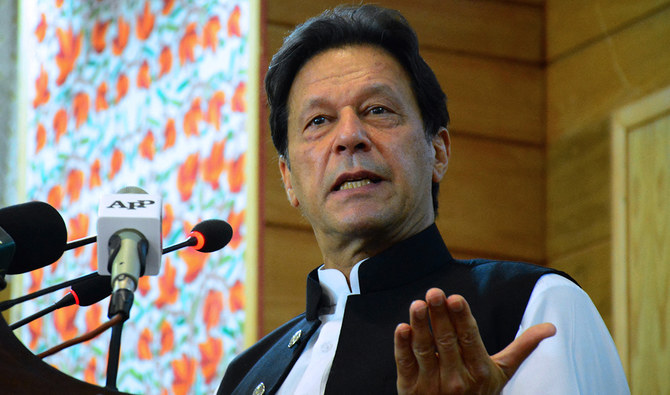ISLAMABAD: Former prime minister Imran Khan on Wednesday condemned a recent decision of the Supreme Court of India that upheld New Delhi’s decision to revoke the special constitutional status of Kashmir, expressing concern it would further aggravate the situation in the disputed Himalayan region.
Faced with serious legal and political challenges, Khan’s statement was posted on his social media account by members of his Pakistan Tehreek-e-Insaf (PTI) party since he has been in prison following his conviction in a graft case on August 5.
Last week, he also issued policy statements on Israel’s war in Gaza and Pakistan’s decision to deport Afghan nationals in an apparent bid to keep PTI voters engaged and motivated ahead of the next general elections.
Discussing the decision of India’s superior judiciary over New Delhi’s decision taken in August 2019, he described the verdict as sheer violation of the United Nations Security Council (UNSC) resolutions that recognize the Kashmir as the disputed territory and uphold the right to self-determination for its people.
“In a special message from Adiala Jail, the PTI Founding Chairman strongly reacted to the Indian top court’s verdict retaining Narendra Modi-led government’s unilateral, unconstitutional and unlawful decision to stripping the occupied Jammu and Kashmir of its special status on August 5, 2019,” the PTI said in a social media post on X.
“PTI Founding Chairman recalled that the international community had guaranteed the basic right to self-determination to the oppressed people of Kashmir through UNSC’s resolutions,” it added.
Khan blamed the Pakistan government on putting the Kashmir issue on the back burner and said his party would continue to support the “unprecedented and just struggle of the Kashmiri people for their freedom and right to self-determination.”
“The controversial and unlawful decision of the Indian top court would further complicate the Kashmir issue instead of helping to solve the decades-long conflict,” he added.
India’s only Muslim-majority region, Jammu and Kashmir has been at the heart of more than 75 years of animosity with Pakistan since the birth of the two nations in 1947 at independence from colonial rule by Britain.
Both countries claim the region in full, but only control parts of it.
Earlier this week, India’s Supreme Court upheld the decision of Prime Minister Narendra Modi’s government to revoke the special status for Jammu and Kashmir and set a deadline of September 30 next year to hold local polls.






















